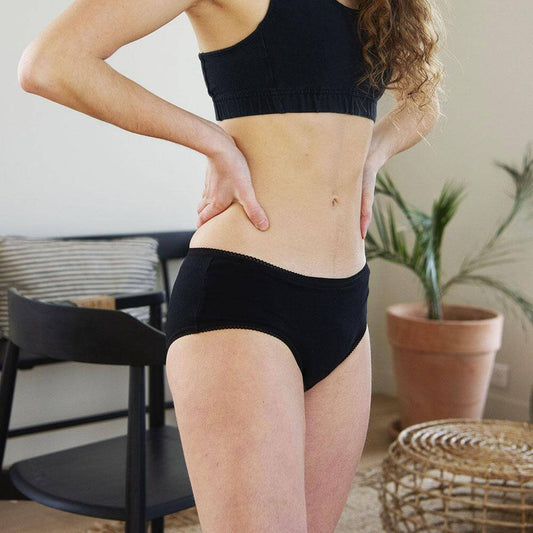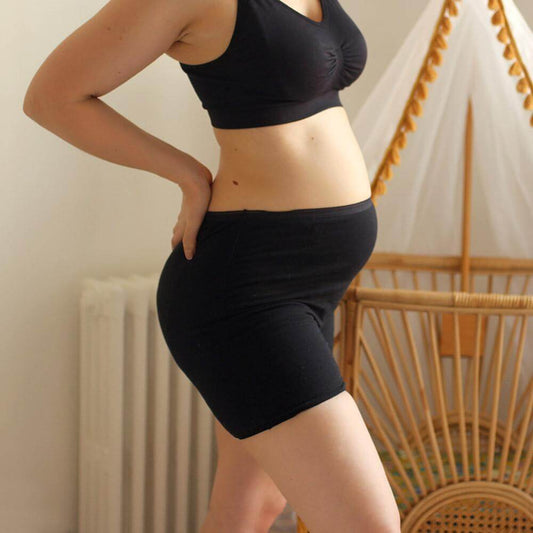On en entend de plus en plus parler, mais qu’est-ce que le syndrome de la fesse morte ? Non, rassurez-vous, vos fessiers ne vont pas subitement rendre l’âme ! Mais rester assise de longues heures chaque jour peut avoir des conséquences inattendues pour votre bien-être (et vos fesses). En tant que marque qui met la santé des femmes au cœur de tout ce qu’elle fait, on vous explique comment détecter et surtout, comment réveiller ces muscles endormis !
Qu’est-ce que le syndrome de la fesse morte ?
C’est simple : à force de rester vissée sur une chaise (on vous comprend, le télétravail a ses bons côtés), nos muscles fessiers se mettent en mode pause. Ce qui veut dire qu’ils ne se contractent plus comme ils devraient. Et comme le grand fessier et ses copains le moyen et le petit fessier sont là pour stabiliser le bassin et absorber les chocs, ils finissent par "oublier" comment bouger correctement. Résultat ? Douleurs dans le bas du dos, hanches raides, jambes lourdes… et parfois même des fuites inattendues pendant nos périodes de règles, à cause d’une posture affaiblie. Personne n’a envie de ça, n’est-ce pas ?
Pourquoi est-ce un problème (surtout pour nous, les femmes) ?
Le syndrome de la fesse morte n’est pas juste une question de confort, il peut aussi avoir des répercussions sur tout le corps, surtout en période de menstruations. Pendant nos règles, les douleurs lombaires et pelviennes sont souvent au rendez-vous, et si en plus nos fessiers sont trop paresseux pour faire leur travail de stabilisation, c’est la double peine ! Un peu de faiblesse musculaire, et nous voilà avec un mal de dos qui dure toute la journée. Oui, on sait, ce n’est vraiment pas ce dont on a besoin…
Comment savoir si on est concernée ?
Voici quelques signes qui ne trompent pas :
- Vous sentez une gêne ou une douleur au bas du dos après être restée assise un long moment (les fessiers inactifs forcent les lombaires à compenser).
- Vous avez du mal à vous lever ou à marcher après une position assise prolongée.
- Vos fessiers se contractent difficilement quand vous faites des exercices (oui, le squat tout bancal, on connaît !).
Pas de panique ! Il est tout à fait possible de réveiller ces muscles fainéants et d’éviter qu’ils ne sombrent dans une léthargie totale.
Les astuces Elia pour réveiller vos fessiers… et booster votre bien-être
On ne va pas vous dire de vous lancer dans un marathon, promis. Voici quelques petites habitudes faciles à intégrer dans votre quotidien :
- Levez-vous, bougez, marchez ! Toutes les heures, prenez une pause pour faire quelques pas. Allez chercher un verre d’eau, étirez-vous, ou faites le tour du salon. Bref, tout pour éviter de rester collée à votre chaise.
- Exercices express à faire entre deux réunions : le pont fessier (couchée sur le dos, soulevez vos hanches), ou encore les fentes avant et les étirements de jambes. Ces mouvements permettent de réactiver les muscles fessiers en douceur.
- Variez les positions assises : utilisez un coussin d’assise ergonomique, ou optez pour un bureau assis-debout. Varier les positions réduit la pression sur le bassin et stimule la circulation sanguine.
- Choisissez des vêtements qui respirent : Nos culottes menstruelles Elia, fabriquées en coton bio et respectueuses de votre peau, sont idéales pour éviter les compressions inconfortables et favoriser un meilleur confort, même pendant vos règles !
Le lien avec les menstruations (oui, on y arrive)
Eh oui, le syndrome de la fesse morte ne concerne pas seulement les athlètes qui ne s’échauffent pas ou les sédentaires chroniques. Pendant les règles, le corps change, et la sédentarité combinée aux variations hormonales peut accentuer les tensions dans le bas du dos et la zone pelvienne. Nos muscles fessiers, déjà paresseux, le deviennent encore plus, ce qui n’aide ni notre posture ni notre bien-être général. Mais pas de panique, quelques exercices, un peu de mouvement, et voilà des fessiers de nouveau en pleine forme !
Alors, on se lève, on bouge, et on dit adieu à l’amnésie fessière ! Vous verrez, vos fesses vous remercieront, et peut-être même que vos douleurs de règles se feront plus discrètes.
Prendre soin de nos muscles, c’est aussi prendre soin de notre santé intime.










